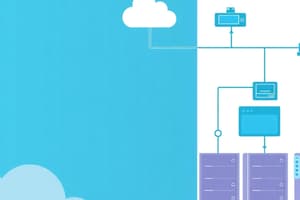Podcast
Questions and Answers
What is essential for inventory purposes and auditing regarding licenses?
What is essential for inventory purposes and auditing regarding licenses?
- Ignoring license usage reports
- Using software trial versions
- Carefully documenting license details for each component (correct)
- Consolidating all licenses into one document
Regular reviews of license usage are unnecessary if the licenses were initially applied correctly.
Regular reviews of license usage are unnecessary if the licenses were initially applied correctly.
False (B)
What is the primary purpose of following best practices for licensing?
What is the primary purpose of following best practices for licensing?
To ensure optimal use and cost-effectiveness for the licensing scheme.
Maintaining up-to-date licensing and avoiding gaps in coverage during the ______ of the implementation is important.
Maintaining up-to-date licensing and avoiding gaps in coverage during the ______ of the implementation is important.
Match the following licensing concepts with their descriptions:
Match the following licensing concepts with their descriptions:
What is the main purpose of licensing in vCloud Foundation 5.2?
What is the main purpose of licensing in vCloud Foundation 5.2?
Aria Operations for Networks requires a license that is dependent on other components in the Aria Suite.
Aria Operations for Networks requires a license that is dependent on other components in the Aria Suite.
What are the different license types mentioned for vCloud Foundation 5.2?
What are the different license types mentioned for vCloud Foundation 5.2?
A separate license is required to enable the functions provided by the __________ component.
A separate license is required to enable the functions provided by the __________ component.
Match the following license types with their functionalities:
Match the following license types with their functionalities:
Which of the following is NOT a process involved in managing licenses?
Which of the following is NOT a process involved in managing licenses?
Regular compliance checks are essential to ensure ongoing authorized use of licenses.
Regular compliance checks are essential to ensure ongoing authorized use of licenses.
What mechanism is implemented to avoid conflicts between licenses for different Aria Suite components?
What mechanism is implemented to avoid conflicts between licenses for different Aria Suite components?
What is the primary purpose of post-scaling verification?
What is the primary purpose of post-scaling verification?
After scaling, all security updates and patches should be ignored if there were no security incidents during the process.
After scaling, all security updates and patches should be ignored if there were no security incidents during the process.
What must be logged and documented after the scaling process?
What must be logged and documented after the scaling process?
Planning for scaling requires considering the potential for ______ to avoid wasted resources.
Planning for scaling requires considering the potential for ______ to avoid wasted resources.
Match the potential challenges with their descriptions:
Match the potential challenges with their descriptions:
What should be verified to ensure proper security after scaling?
What should be verified to ensure proper security after scaling?
Establishing a monitoring process after scaling is unnecessary if initial scaling goals are met.
Establishing a monitoring process after scaling is unnecessary if initial scaling goals are met.
Name one crucial step to confirm successful scaling implementation.
Name one crucial step to confirm successful scaling implementation.
What is horizontal scaling primarily focused on?
What is horizontal scaling primarily focused on?
Vertical scaling can be done without any downtime for the existing services.
Vertical scaling can be done without any downtime for the existing services.
What tools may be required to monitor current performance metrics in a scaling assessment?
What tools may be required to monitor current performance metrics in a scaling assessment?
Before starting any scale operation, it is crucial to assess the current __________ and performance.
Before starting any scale operation, it is crucial to assess the current __________ and performance.
Match the types of scaling with their definitions:
Match the types of scaling with their definitions:
What should be considered when planning additional resources?
What should be considered when planning additional resources?
Deployment in vCloud Foundation can only be done using physical hardware.
Deployment in vCloud Foundation can only be done using physical hardware.
What may indicate the need for scaling in an Aria Suite deployment?
What may indicate the need for scaling in an Aria Suite deployment?
Flashcards
License Best Practices
License Best Practices
A set of guidelines for effective and efficient use of VMware licenses, ensuring optimal use and cost-effectiveness.
License Documentation
License Documentation
Detailed records that track each component's license details for inventory and auditing purposes.
License Review
License Review
Regular checks of license usage to identify potential overages or inaccuracies.
License Coverage
License Coverage
Signup and view all the flashcards
Software Licensing
Software Licensing
Signup and view all the flashcards
What is vCloud Foundation 5.2's approach to licensing?
What is vCloud Foundation 5.2's approach to licensing?
Signup and view all the flashcards
What is a key aspect of the Aria Suite?
What is a key aspect of the Aria Suite?
Signup and view all the flashcards
Aria Operations for Networks
Aria Operations for Networks
Signup and view all the flashcards
What are license types in vCloud Foundation 5.2?
What are license types in vCloud Foundation 5.2?
Signup and view all the flashcards
How is license management done?
How is license management done?
Signup and view all the flashcards
Why is license management crucial?
Why is license management crucial?
Signup and view all the flashcards
What is the benefit of granular licensing?
What is the benefit of granular licensing?
Signup and view all the flashcards
What's the relation between licensing and vCloud Foundation?
What's the relation between licensing and vCloud Foundation?
Signup and view all the flashcards
Horizontal Scaling
Horizontal Scaling
Signup and view all the flashcards
Vertical Scaling
Vertical Scaling
Signup and view all the flashcards
Network Scaling
Network Scaling
Signup and view all the flashcards
Pre-scaling Assessment
Pre-scaling Assessment
Signup and view all the flashcards
Resource Planning
Resource Planning
Signup and view all the flashcards
Deployment Considerations
Deployment Considerations
Signup and view all the flashcards
What are the key aspects of scaling Aria Suite?
What are the key aspects of scaling Aria Suite?
Signup and view all the flashcards
Why is pre-scaling assessment crucial?
Why is pre-scaling assessment crucial?
Signup and view all the flashcards
Post-Scaling Verification
Post-Scaling Verification
Signup and view all the flashcards
Security and Access Controls
Security and Access Controls
Signup and view all the flashcards
Scaling Complexity
Scaling Complexity
Signup and view all the flashcards
Scaling Downtime
Scaling Downtime
Signup and view all the flashcards
Scaling Monitoring
Scaling Monitoring
Signup and view all the flashcards
Overprovisioning
Overprovisioning
Signup and view all the flashcards
What is Post-Scaling Verification?
What is Post-Scaling Verification?
Signup and view all the flashcards
Why is Security Important After Scaling?
Why is Security Important After Scaling?
Signup and view all the flashcards
Study Notes
License Management in vCloud Foundation 5.2
- vCloud Foundation 5.2 provides comprehensive license management for all Aria Suite components, particularly Aria Operations for Networks.
- Licensing ensures authorized use and prevents compliance issues.
- Appropriate licenses must be purchased and provisioned for each component to guarantee functionality.
- Granular licensing enables cost-effective implementation.
Aria Suite Components and Licensing
- The Aria Suite is a collection of management tools for vCloud Foundation.
- Licensing is crucial for all Aria Suite components.
- Specific licenses are needed for each component, with different functionality levels depending on the license model.
Aria Operations for Networks
- Aria Operations for Networks manages networks within the Aria Suite.
- Licensing is independent from other Aria Suite components.
- A separate license is needed to use Aria Operations for Networks' functions.
- Features like advanced reporting and proactive monitoring have varying license requirements.
License Types and Functionality
- vCloud Foundation 5.2 uses different license types (e.g., basic, standard, advanced) for varying Aria Suite component functionality.
- License options allow users to purchase only required features.
- Licensing models adapt to the specific product and its integration with vCloud Foundation.
Managing Licenses
- Proper license management is essential.
- The process includes purchase, key management, activation, registration, and ongoing monitoring.
- Activation may involve VMware support procedures.
- Regular license compliance checks confirm authorized use.
- Ongoing license monitoring and reporting aid auditing and identify potential issues.
License Conflicts and Resolutions
- A managed allocation mechanism avoids license conflicts between Aria Suite components.
- Correct initial deployment prevents future issues.
- VMware support handles license-related problems.
- Standardized solutions address license conflicts.
Licensing Best Practices
- Detailed license application documentation exists in vCloud Foundation 5.2 implementations.
- Adhering to best practices optimizes licensing and reduces costs.
- Comprehensive license documentation and inventory are crucial for auditing and tracking.
- Regular usage reviews prevent overages and ensure accuracy.
- Keeping licenses current across the system's lifecycle is crucial.
- Ensuring all necessary software is appropriately licensed is a key practice.
Scaling an Existing Aria Suite Deployment in vCloud Foundation 5.2
- Scaling an existing Aria Suite deployment involves adapting resources to meet increased demand. Key aspects include determining necessary resources (CPU, memory, storage, network bandwidth) and ensuring infrastructure handles the increased workload.
Scaling Methods
- Horizontal Scaling: Adding more instances to distribute workload. Careful planning of shared resources (storage, databases) is vital.
- Vertical Scaling: Increasing resources (CPU, memory, storage) of an existing instance. May involve hardware/VM upgrades, often requiring downtime.
- Network Scaling: Ensuring sufficient network bandwidth to support increased traffic. Evaluate virtual and external network connections.
Pre-Scaling Assessment
- Monitor current performance metrics (CPU, memory, network). Tools like vRealize Operations Manager can help.
- Analyze application logs to detect bottlenecks.
- Evaluate capacity of underlying resources (storage, compute, network).
Resource Planning
- Project workload increases for applications and components.
- Define desired performance levels.
- Identify potential performance limitations from infrastructure or applications (e.g., database latency).
- Plan capacity for the entire system, including virtual machine cluster and underlying infrastructure.
Deployment Considerations
- Use vCloud Director to provision VMs or adjust existing VMs per scaling plan.
- Configure and manage storage volumes.
- Ensure network connectivity and traffic routing for scaled components.
Post-Scaling Verification
- Monitor and verify performance to confirm expected benefits.
- Ensure Service Level Agreements (SLAs) are met/exceeded.
- Document parameters adjusted and scaling process for future reference.
- Validate scaling by applying expected workloads and confirming against specifications.
Security and Access Controls
- Verify appropriate access controls for added resources.
- Apply security updates, patches, and hardened configurations.
- Log and monitor user access, enforcing access controls.
Potential Challenges
- Complexity: Scaling can be complex, requiring careful planning and execution.
- Downtime: Some scaling operations (service/application rescaling) require downtime—plan to minimize it.
- Monitoring: Establish effective monitoring and reporting processes for scaled infrastructure performance.
- Overprovisioning: Potential for wasted resources, especially with lower demand—plan accordingly for anticipated peaks.
Studying That Suits You
Use AI to generate personalized quizzes and flashcards to suit your learning preferences.
Description
This quiz explores the concepts of license management within vCloud Foundation 5.2, focusing on the Aria Suite components. It highlights the importance of proper licensing for compliance and discusses the specific requirements of Aria Operations for Networks. Test your knowledge on effective licensing strategies and their significance in network management.




